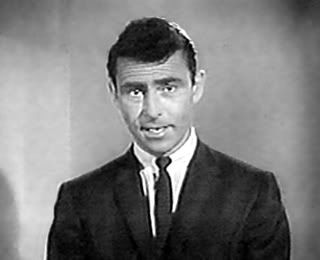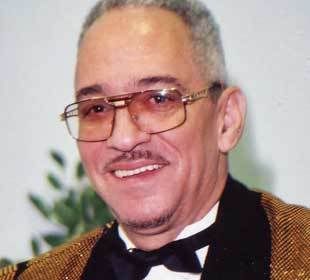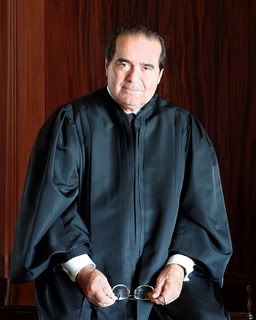Do you recognize this man?
His name is Rod Serling and he once hosted an amazing little television show called the Twilight Zone. Each week, he would appear to announce the story of someone trapped in a bizarre set of circumstances, typically surreal and frightening. It was fiction, but great fun.
I suddenly find myself looking for Rod Serling to appear again because I am suffering from the same uncomfortable sensation of surreality, except this time it is neither fiction nor fun.
Do you recognize this man?
Of course you do. The traditional media and blogosphere have been talking about him around the clock. Over at Big Orange, there have been over 650 diaries about Rev. Jeremiah Wright during the past week. If there was nothing else newsworthy, I might understand how a retired pastor basking in the media limelight could get so many knickers in a twist.
Do you recognize this man?
I do not want to detract from Wrightfest, but I think there is something you should know. You live in a country where one of the Supreme Court justices goes on national television and says that torture is not prohibited in the U.S. Constitution.
Here is what Antonin Scalia told Lesley Stahl during a 60 Minutes interview on Sunday.
Point 1. The Constitution does not prohibit torture.
“I don’t like torture,” Scalia says. “Although defining it is going to be a nice trick. But who’s in favor of it? Nobody. And we have a law against torture. Everything that is hateful and odious is not covered by some provision of the Constitution,” he says.
Point 2. Torture does not qualify as cruel and unusual punishment.
“If someone’s in custody, as in Abu Ghraib, and they are brutalized by a law enforcement person, if you listen to the expression ‘cruel and unusual punishment,’ doesn’t that apply?” Stahl asks.
“No, No,” Scalia replies.
Point 3. Torture to extract information (such as a bogus confession) is not covered in the Constitution.
“Cruel and unusual punishment?” Stahl asks.
“To the contrary,” Scalia says. “Has anybody ever referred to torture as punishment? I don’t think so.”
“Well, I think if you are in custody, and you have a policeman who’s taken you into custody…,” Stahl says.
“And you say he’s punishing you?” Scalia asks.
“Sure,” Stahl replies.
“What’s he punishing you for? You punish somebody…,” Scalia says.
“Well because he assumes you, one, either committed a crime…or that you know something that he wants to know,” Stahl says.
“It’s the latter. And when he’s hurting you in order to get information from you…you don’t say he’s punishing you. What’s he punishing you for? He’s trying to extract…,” Scalia says.
“Because he thinks you are a terrorist and he’s going to beat the you-know-what out of you…,” Stahl replies.
Point 4. Scalia is certain of his position.
“Anyway, that’s my view,” Scalia says. “And it happens to be correct.”
When a Supreme Court justice argues that torture cannot be readily defined, does not fall under the purview of the U.S. Constitution, and harsh treatment to extract information is not torture or punishment, we are in serious trouble as a society. Unlike Jeremiah Wright, Scalia’s words matter. Scalia is one of a very small group of individuals in our society granted the ultimate authority to interpret the laws of the United States.
Scalia was not bothered by the international treaties and laws of which the United States has ratified that prohibit torture, even though the Constitution indicates that those treaties are the law of the land.
(Article VI, Section 2): “This Constitution, and the Laws of the United States which shall be made in Pursuance thereof; and all Treaties made, or which shall be made, under the Authority of the United States, shall be the supreme Law of the Land.
Scalia says that torture is difficult to define, even though there is a federal statute that defines it clearly.
A federal anti-torture statute (18 U.S.C. § 2340A), enacted in 1994, provides for the prosecution of a U.S. national or anyone present in the United States who, while outside the U.S., commits or attempts to commit torture. Torture is defined as an “act committed by a person acting under the color of law specifically intended to inflict severe physical or mental pain or suffering (other than pain or suffering incidental to lawful sanctions) upon another person within his custody or physical control.”
Scalia’s comments raise two questions. If a citizen of another country in U.S. custody is tortured to extract information, including confession of guilt, can the information be used in legal proceedings against the individual? This situation exists in detainees coming to trial being held in Guantanamo. If a U.S. citizen is accused of being involved in terrorism, would torture be a legally defensible method to extract information? This situation has already taken place with Jose Padilla. We are already on a slippery slope and Scalia has the means and opportunity to further grease our slide back into barbarity.
The media barely noticed Scalia’s comments. Rolling Stone gave it a small blurb in their national affairs section of the April 28 edition. Scalia can say something far more offensive than Wright, say it on national television, and almost no one notices.
This is not the first time Scalia has made this point.
Hudson v. McMillian: “For generations, judges and commentators regarded the Eighth Amendment as applying only to torturous punishments meted out by statutes or sentencing judges, and not generally to any hardship that might befall a prisoner during incarceration.” (Thomas & Scalia, JJ., dissenting.)
As long as torturous treatment befalls you as a prisoner during incarceration, the Eighth Amendment does not apply. The simple minded defense of Scalia in the CBS interview is that he was only pointing the Eighth Amendment does not cover torture. This pathetic parsing overlooks the fact that Scalia was careful to note that “everything that is hateful and odious is not covered by some provision of the Constitution.” He was also careful to not offer anything that might be taken as constitutional prohibition against torturous treatment of prisoners. I cannot help but think that this man would have loved the delicious tale of society creating the legal justification for torture while its citizens were preoccupied with trivia.
That’s because – until recently – he was often on the losing side in cases he cared about most. Over the last several years Scalia has reached outside the court, speaking out publicly about his philosophy, in hopes of influencing the next generation. It’s a role he relishes.
“Little kids come to the court, they’re brought by their teachers. And they recite very proudly what they’ve been taught. I mean, this is how widespread the notion has become that ‘The Constitution is a living document.’ And I have to tell them ‘It’s a dead document,'” Scalia told the students at the Oxford Union.
Certainly seems like a dead document in the hands of too many powerful people in American government these days.




24 comments
Skip to comment form
Author
It was one of the shows that I found a way to watch no matter what. Living in the Twilight Zone is less amusing.
The fuckin’ Legion of Doom is brought to you by your US Supreme Court courtesy of the spineless US Senate.
of Scalia’s lately of trying to reframe discussion of torture by saying “it’s not torture if it isn’t done to punish” is the same old same old insulting assumption that people are too stupid to see through his insulting assumptions.
If a court sentenced the accused as punishment for a crime to be drawn and quartered, that would be an 8th Amendment violation, it would be cruel and unusual punishment. But if the Court didn’t sentence you to being drawn and quartered, and the guards decide to impose that on you on their own, that’s not an 8th Amendment violation, so apparently says Scalia. He might even argue that if the prison holding a prisoner decided to give him/her only bread and water that wouldn’t be an 8th Amendment violation, because the bread and water wasn’t ordered by the sentencing Court.
There’s not a majority on the Court for this kind of BS and I think you’d have to overturn lots of precedent to make that seem to be the law, but Scalia and Thomas say that’s the law and they’re advocating for it. There are 2 votes for that horrendous interpretation of the Constitution now in the Supreme Court. And they are attempting to make this argument acceptable by repeating it over and over again outside the Court. Can they convince
ScAlito and Roberts of this point? Can they convince Kennedy of this point? Who knows?This is a big, big, big reason for electing a Democrat, any Democrat in November. If any more of these wing nuts get on the Court, it’s really game over for the next several decades.
how one contrasts to the other
so, Rev. Wright’s extreme (thinking people in the gov’t may have had lots to gain by allowing 9/11 to happen or infecting people of color with HIV/Aids) up against Scalia, trying to say torture isn’t punishment. might be an interesting experiment.
maybe make a whole list of differences between these men.
it’s all important.it’s the relationships and context we need to be better at portraying.